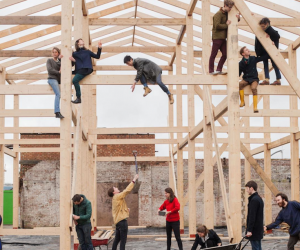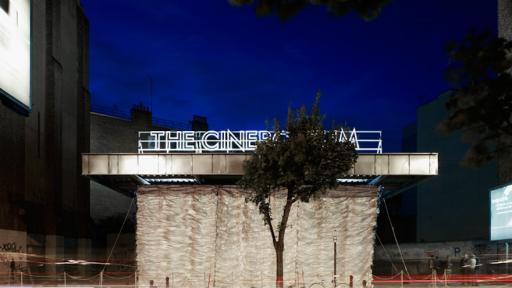From the Series
Part of the event
In an unprecedented victory, architecture practice Assemble has won this year's Turner Prize for the socially-driven regeneration work they did on 10 houses in Liverpool's Granby Four Streets. Never before has an architectural project even been nominated (Assemble's nomination came with a fair amount of controversy) and the success of a collective that is 18 men strong is certainly a move away from the honouring a single artistic genius. None of the young members of the London-based collective are even qualified architects yet, but they certainly don't lack creative thinking when it comes to socially responsible work.
The houses on Granby Four Streets in Toxteth are typical Liverpool terraced houses, built at the beginning of the twentieth century as homes for artisanal workers. The buildings and shops have been derelict for decades, condemned to be demolished for development and emptied of residents. The community have been waging a war of guerilla gardening and underground urban renewal in the properties for several years. In the last year, Assemble have helped to bring that artisanal heritage back to the streets and with it activity, festivity and hope.
The collective, whose work often involves public spaces and public participation, were unsure how to accept the prestigious nomination, seeing as it elevated their community project from the street to the gallery, which is a little counter to what they had originally intended. They had never before thought of themselves as artists.
The inclusion of Granby Four Streets in the Turner Prize hall of fame has forced the art world to think again about what can be defined as art. Granby Four Streets is technically a social enterprise project and the first "non-art" work to win, but it was imaginative and provoking, involved large-scale community involvement, DIY skills and craftsmanship, renovation, beautification and neighbourhood renewal. And the Turner Prize jury have never been shy of questioning the established mentality towards art.
The various projects Assemble has carried out, including an outdoor cinema in an old petrol station and a brutalist playground, start with the people and the spaces and work upwards, imagining what is possible in collaboration with those it will effect rather than starting with a policy, plan or abstract vision and working down. Assemble took the time sit with the residents of Granby and discuss what they wanted and together they worked to create a street that celebrates faults, missing windows and exposed bricks.
Assemble have consciously shared the attention that the Turner Prize has brought them with the residents of Granby, acknowledging that the battle to save the street started about 25 years ago (before many of them were even born). The work that Assemble have added to the streets has further deepened the community's pride and sense of ownership of the space, and the Turner Prize award is surely down to the thoughtful, outward-thinking approach that Assemble employed.
Assemble will be speaking at Design Indaba Conference 2016, which takes place from 17 to 19 February 2016. Book here.











